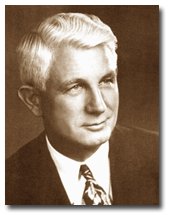1906 – 1990
Advanced resolution of social issues and improved social work professional standards from the private business world
Armed with master’s degrees from the University of Southern California in both economics and social work, George Nickel was well equipped to begin his social work career during the worst depression in the nation’s history. His first work was with unemployed homeless single men and with couples entering Rancho Los Amigos, the Los Angeles County Poor Farm. In 1932, he was invited to become director of the Kern County Welfare Program when it received funds through the Emergency Relief and Construction Act to address the relief of needy and distressed people. Over the opposition of many in that county, he successfully developed innovative projects that both relieved the stress on individuals and added economic and social benefits to the larger community experiencing the great influx of migrants from the Dust Bowl.
Nickel then became statewide Director of Social Services for the newly created California State Relief Administration, working closely with its director, Charles Schottland. In 1938, the Beneficial Management Corporation, seeking a Western Area Public Relations Director, approached Nickel for suggestions. The company was concerned with the sharply rising interest rates required of persons who needed personal loans and wanted to persuade the legislatures to place a lower ceiling on the interest that could be charged. Nickel was convinced to accept that position himself, with the understanding that he could use his time and corporation resources to deal with social issues. He continued to carry out this arrangement for the rest of his working life, engaging in a variety of activities of benefit to social work and social welfare.
During WWII, Nickel carried on a placement service, nationally and in California, for children in Europe displaced by the war. As the war drew to a close, he persuaded the California legislature to retain the child care programs that had been established under the wartime Lanham Act and that were abandoned in every other state, thus creating in California a strong nucleus for day care and after-school care for children of working mothers. He was the prime founder of the movement to create Consumer Credit Counseling Services, the first established in San Diego and Los Angeles. Now there are more than 300 across the nation. He was instrumental in the passage of the first legislation to create licensing for California social workers. He was a valuable ally in the passage of mental health legislation in the 1950s, and he was the key founder of California Social Welfare Archives. In addition, he worked on a variety of key public commissions, agency boards and professional associations, local as well as national.
Nickel’s contributions to social work as a profession and to the field of social welfare in California, as well as elsewhere, form the foundation of much that was to follow.
